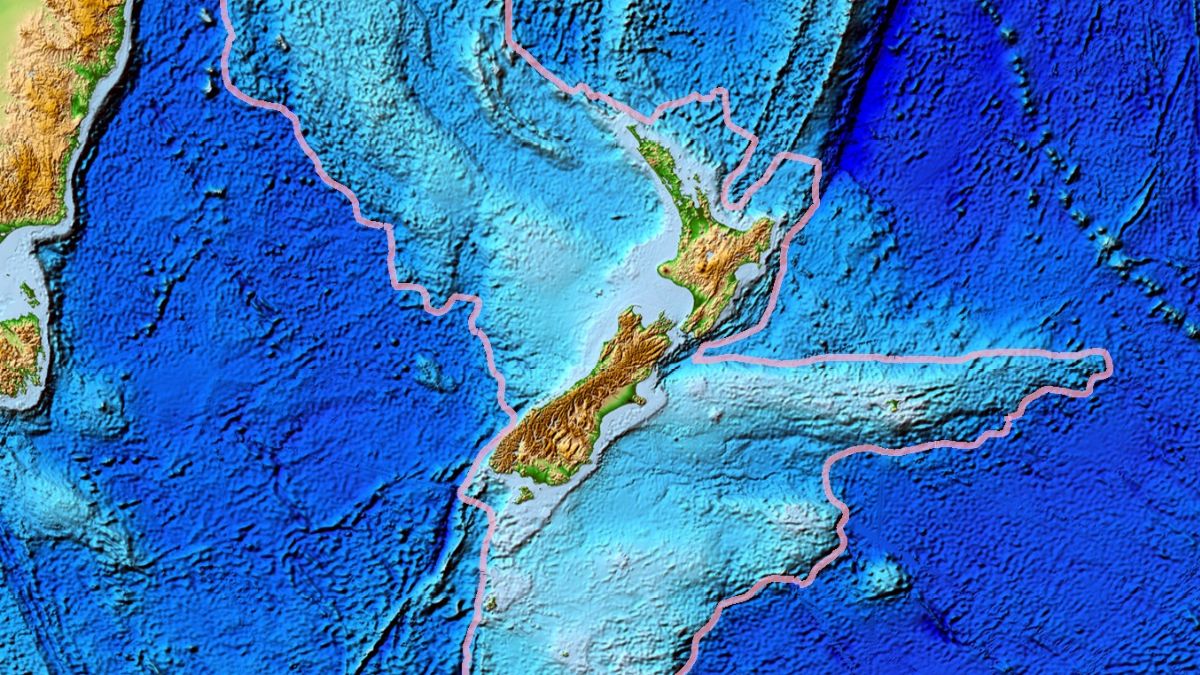Eighth Continent Discovered After 375 Years, Named Zealandia
In a groundbreaking discovery, a team of geologists hailing from New Zealand, New Caledonia, Australia, the United States, Denmark, and Tasmania have unveiled the existence of a new continent, aptly christened Zealandia. Unlike its larger continental counterparts, Zealandia resides largely submerged beneath the ocean's depths, with only a fraction of its landmass visible above the water's surface, notably encompassing the islands of New Zealand and New Caledonia.
Unveiling Zealandia: A New Frontier
Zealandia, though diminutive in size when compared to its continental siblings, packs a geological punch. This newfound landmass stretches over an area nearly six times that of Madagascar. It distinguishes itself as Earth's tiniest, thinnest, and most youthful continent, believed to have separated from the supercontinent Gondwana approximately 83 million years in the past.
The very revelation of Zealandia's existence represents a significant milestone in scientific exploration. This remarkable feat owes its success to cutting-edge technological advancements that empowered the geologists to explore the ocean floor and procure invaluable rock samples. Employing a myriad of techniques, including satellite imagery, seismic surveys, and the meticulous art of dredging, the research team painstakingly crafted a detailed cartography of Zealandia.

Unraveling Earth's Geological Enigma
The unearthing of Zealandia offers the scientific community an unparalleled opportunity to delve deeper into Earth's geological history. This discovery promises to unravel the intricate processes that have sculpted our planet over eons. The continent's unique characteristics and its connection to the Gondwanan supercontinent challenge established geological paradigms.
Zealandia's significance transcends scientific curiosity alone. It bears profound implications for the region's conservation efforts and resource management. Understanding this submerged continent may hold the key to preserving its distinct ecosystems and managing resources sustainably.
Zealandia in Focus: Key Highlights
To shed light on Zealandia's newfound significance, here are some key details about this intriguing continent:
Geographic Location
Situated in the southwestern Pacific Ocean, Zealandia lies to the east of Australia.
Vast Expanse
Zealandia's total land area spans approximately 1.89 million square miles (4.9 million square kilometers).
Oceanic Dominance
Remarkably, a staggering 94% of Zealandia remains submerged beneath the ocean's surface.
Pinnacle of Zealandia
Mount Cook in New Zealand, towering at a majestic 12,316 feet (3,754 meters), claims the title of Zealandia's highest point.
Unique Biodiversity
Zealandia boasts a rich tapestry of unique flora and fauna, including iconic species like the kiwi, the kakapo, and the tuatara.
A Humbling Reminder
The discovery of Zealandia serves as a poignant reminder of the inexhaustible mysteries our planet holds. As we marvel at the unveiling of this hidden continent, we must also recognize our responsibility to safeguard the oceans and the extraordinary ecosystems they harbor.
In conclusion, Zealandia's emergence from the depths of the Pacific Ocean is a testament to human ingenuity, scientific progress, and the ceaseless wonder of our world. It beckons us to explore, conserve, and cherish the treasures of our planet's hidden realms.
Frequently Asked Questions (FAQs)
-
What makes Zealandia unique among continents? Zealandia is distinctive for being the smallest, thinnest, and youngest continent on Earth, and it resides mostly submerged beneath the ocean.
-
How was Zealandia's discovery made possible? Advances in technology, such as satellite imagery, seismic surveys, and dredging, played a pivotal role in mapping Zealandia's ocean floor and uncovering its existence.
-
Why is Zealandia's discovery significant for science? Zealandia's discovery provides valuable insights into Earth's geological history and the processes that have shaped our planet.
-
What are the implications of Zealandia's discovery for conservation? Understanding Zealandia's unique ecosystems is crucial for effective conservation efforts in the region.
-
How can we protect our oceans and the ecosystems they support? To protect our oceans, we must promote sustainable practices, reduce pollution, and support conservation initiatives that safeguard marine life.
Remember to stay informed about ongoing research on Zealandia, as it continues to reveal secrets about our planet's history and evolution.
.png)
.png)
